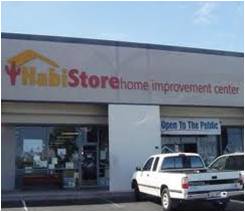“Life is either a daring adventure or nothing.”
— Helen Keller
If you are following my suggestion and turning your old home into a rental house, or if you are just purchasing an investment fixer upper house, use these 5 steps to prepare your house to rent out.
Step 1: Remove Furniture
Move all of your furniture and personal belongings out of your old house. The absence of these items makes the house look bigger and the home is more inviting if it is not cluttered up with beds, chairs, food supplies, and toys. It also makes it easier to do a thorough job of cleaning the house.
This only applies to the first time you rent out your new rental house. After tenants leave in the future, they will take most of their things with them. Of course, some tenants do not follow the normal procedure, and they may leave in the middle of the night to avoid paying their last rent check.
(Occasions like this make it tempting to slip a magnetized GPS tracking device under the fender of the renter’s car.)
An incident like this happened to me a couple of years ago. Not only did the tenant leave a pile of clothing, bottles and boxes of cleaning supplies, cupboards of food, and a sofa, but also left behind a car that didn’t work. (So much for the GPS idea.)
Renters like this one are the exception. Tenants normally take all their things with them when they leave, making it easy for me to prepare the property for the next tenant, and without much effort, present an appealing yet empty house.
Step 2: Clean Up
Thoroughly clean the house. This includes painting walls (a fresh coat of paint makes the place look and smell good), washing floors, cleaning appliances (especially the oven), shampooing carpets, washing the windows, cleaning the bathrooms and checking the roof.
Step 3: Make Repairs
Take care of all repair work. Leave nothing to chance and make all repairs before tenants move in. Change broken outlets and switches, patch holes, remove stains, replace cracked and broken glass, repair dripping faucets, replace missing shingles, and fix roof leaks.
The old saying that “Left to themselves, things always go from bad to worse,” is especially true with rental houses. It’s tempting to assume that that small leak in the bathtub, or a toilet that flushes most of the time, won’t bother anyone. But trust me, you will get that call to repair the bathtub or toilet at the most inopportune time.
This doesn’t mean that everything in the house has to be new, but everything should be in working order.
It is a rental house after all, and not Buckingham Palace.
For example, bedroom doors do not have to be replaced every time they have a crack or a hole in them. I rehabilitate the door with wood putty, and a fresh coat of paint. The guy in the “Easy Repair of Hollow Core Door” video below uses drywall mud to fill the hole, with equally good results.
Buy used construction materials
Missing or broken light switches, outlets, covers can be replaced inexpensively with quality used ones. I have also purchased reliable doors, cabinets, stove tops, dishwashers, and toilets at stores that recycle construction materials, for pennies on the dollar. The Habitat for Humanity Store is one such place that I frequent for good used materials. There are 825 Habitat Restores in the United States and Canada. You can locate a store near you at www.habitat.org
Buy new or used appliances?
If broken clothes washers or dryers cannot be easily repaired, our policy is to replace them with a quality used one, or with lower end new appliances (like the Kenmore brand from Sears).
Buy bargain appliances before you need them
Craigslist and yard sales are great places to find good used appliances at bargain prices. If I see a nice working appliance for a good price, I will purchase it, even though I don’t have any immediate need for it. I’ll just store it in our shed until I need it.
I bought a like-new furnace at a yard sale for only $40 and installed it into a rental house and it has worked great. For furnaces, there are very few moving parts to worry about, and the wiring is relatively simple. As long as the motor works, you’re home free.
I once literally picked up a clothes dryer from the side of the road that had a “Free Dryer” sign taped to it. I gave it a new home and it has been working
reliably for over 10 years now. The only repair, about five years ago, was that I had to change the on/off switch on the door.
Step 4: Simplify Landscaping
The front yard of your rental houses must look great. Curb appeal gives the potential tenants a good first impression. Simple and neat landscaping gives the client comfort that the yard is low maintenance and ecologically and economically low in water consumption saving the tenants money on water and saving you time later not having to replace a yard of dead plants.
I personally like to utilize decorative rocks on our rental yards, and plants that don’t require any watering, like Mesquite and Palo Verde trees, which have long roots that tap into the aquifer.
Step 5: Re-key the Locks
One other thing that I like to do before a new tenant moves in is to re-key all the locks. This is cheaper than buying new doorknobs, and it provides security for our tenants. This protects you and your tenants in case a previous tenant has surreptitiously kept an extra copy of a house key.
Related Posts
Remove that Garbarge Disposal Now!
6 Steps to Roof Maintenance (for the Home that will Turn Into a Rental House)


















